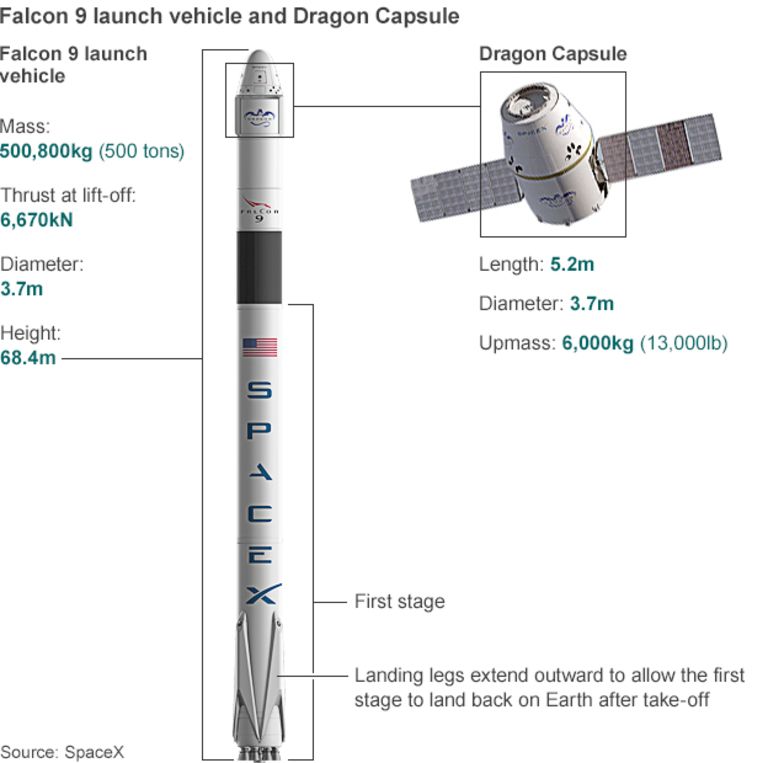SpaceX mission to International Space Station ends in explosion
Rocket fault leads to explosion in third failed space station resupply mission in the past year – video
A free daily email with the biggest news stories of the day – and the best features from TheWeek.com
You are now subscribed
Your newsletter sign-up was successful

An unmanned SpaceX rocket en route to resupply the International Space Station (ISS) exploded and went down in flames just minutes after lift-off.
A malfunction occurred "in the upper-stage liquid oxygen tank", SpaceX CEO Elon Musk tweeted. The craft exploded 139 seconds into the flight on Sunday, just before the first stage of the rocket was due to break off from the upper-stage. Debris from the spacecraft rained into the Atlantic Ocean, according to the BBC.
Cargo on the Dragon SpX-7 spacecraft included computer hardware, food and care packages, "science materials" and spacewalking equipment, as well as a new docking station mechanism needed for the next generation of spacecraft to reach the ISS.
The Week
Escape your echo chamber. Get the facts behind the news, plus analysis from multiple perspectives.

Sign up for The Week's Free Newsletters
From our morning news briefing to a weekly Good News Newsletter, get the best of The Week delivered directly to your inbox.
From our morning news briefing to a weekly Good News Newsletter, get the best of The Week delivered directly to your inbox.
Nasa has a second docking station mechanism that it will be sending up shortly, but will have to build a third to replace the one lost in the Atlantic.
Michael Suffredini, manager of the ISS programme, called the incident a "big loss", but added "we will pick ourselves up and get on to the next flight".
Gwynne Shotwell, chief operating officer of SpaceX, said that the investigation into the crash would last less than a year.
The rocket malfunction is the third failure to bring supplies to the ISS in the past year, following the crash of a Russian rocket in April and a launch accident of another rocket in October.
A free daily email with the biggest news stories of the day – and the best features from TheWeek.com
Nasa said that no negligence had occurred in the Dragon SpX-7 explosion. In a press statement, Nasa administrator Charles Bolden said: "SpaceX has demonstrated extraordinary capabilities in its first six cargo resupply missions to the station and we know they can replicate that success."
The three astronauts currently aboard the ISS have sufficient stores of food and water to last for the next several months.
The US Federal Aviation Administration has classified the explosion as a "mishap".

-
 Should the EU and UK join Trump’s board of peace?
Should the EU and UK join Trump’s board of peace?Today's Big Question After rushing to praise the initiative European leaders are now alarmed
-
 Antonia Romeo and Whitehall’s women problem
Antonia Romeo and Whitehall’s women problemThe Explainer Before her appointment as cabinet secretary, commentators said hostile briefings and vetting concerns were evidence of ‘sexist, misogynistic culture’ in No. 10
-
 Local elections 2026: where are they and who is expected to win?
Local elections 2026: where are they and who is expected to win?The Explainer Labour is braced for heavy losses and U-turn on postponing some council elections hasn’t helped the party’s prospects
-
 Nasa’s new dark matter map
Nasa’s new dark matter mapUnder the Radar High-resolution images may help scientists understand the ‘gravitational scaffolding into which everything else falls and is built into galaxies’
-
 Moon dust has earthly elements thanks to a magnetic bridge
Moon dust has earthly elements thanks to a magnetic bridgeUnder the radar The substances could help supply a lunar base
-
 How Mars influences Earth’s climate
How Mars influences Earth’s climateThe explainer A pull in the right direction
-
 The ‘eclipse of the century’ is coming in 2027
The ‘eclipse of the century’ is coming in 2027Under the radar It will last for over 6 minutes
-
 NASA discovered ‘resilient’ microbes in its cleanrooms
NASA discovered ‘resilient’ microbes in its cleanroomsUnder the radar The bacteria could contaminate space
-
 Artemis II: back to the Moon
Artemis II: back to the MoonThe Explainer Four astronauts will soon be blasting off into deep space – the first to do so in half a century
-
 The mysterious origin of a lemon-shaped exoplanet
The mysterious origin of a lemon-shaped exoplanetUnder the radar It may be made from a former star
-
 The 5 biggest astronomy stories of 2025
The 5 biggest astronomy stories of 2025In the spotlight From moons, to comets, to pop stars in orbit